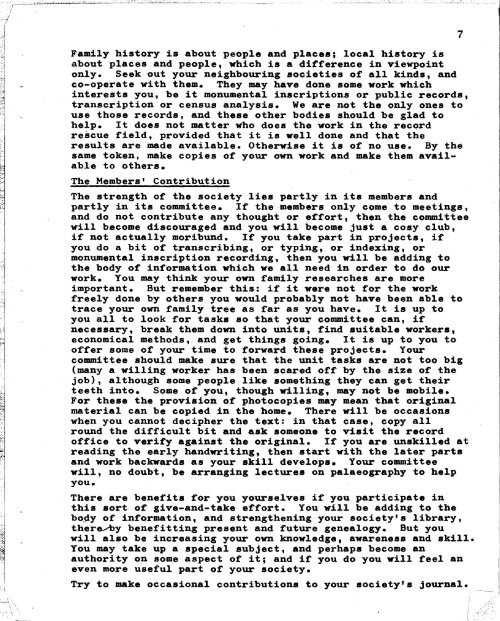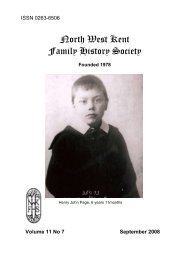You also want an ePaper? Increase the reach of your titles
YUMPU automatically turns print PDFs into web optimized ePapers that Google loves.
Family history is about people and places; local history is<br />
about places and people, which is a difference in viewpoint<br />
only. Seek out your neighbouring societies of all kinds, and<br />
co-operate with them. They may have done some work which<br />
interests you, be it monumental inscriptions or public records,<br />
transcription or census analysis. We are not the only ones to<br />
use those records, and these other bodies should be glad to<br />
help. It does not matter who does the work in the recQrd<br />
re. cue field, provided that it is well done and that the<br />
results are made available. Otherwise it is of no use. By the<br />
same token, make copies of your own work and make them available<br />
to others.<br />
The Members' Contribution<br />
The strength of the society lies partly in its members and<br />
partly in its committee. If the members only come to meetings,<br />
and do not contribute any thought or effort, then the committee<br />
will become discouraged and you will become just a cosy club,<br />
if not actually moribund. If you take part in projects, if<br />
you do a bit of transcribing, or typing, or indexing, or<br />
monumental inscription recording, then you will be adding to<br />
the body of information which we all need in order to do our<br />
work. You may think your own family researches are more<br />
important. But remember this: if it were not for the work<br />
freely done by others you would probably not have been able to<br />
trace your own family tree as far as you have. It is up to<br />
you all to look for tasks so that your committee can, if<br />
necessary, break them down into units, find suitable workers,<br />
economical methods, and get things going. It is up to you to<br />
offer some of your time to forward these projects. Your<br />
committee should make sure that the unit tasks are not too big<br />
(many a willing worker has been scared off by the size of the<br />
job), although some people like something they can get their<br />
teeth into. Some of you, though willing, may not be mobile.<br />
For these the provision of photocopies may mean that original<br />
material can be copied in the home. There will be occasions<br />
when you cannot decipher the text: in that case, copy all<br />
round the difficult bit and ask someone to visit the record<br />
office to verify against the original. If you are unskilled at<br />
reading the early handwriting, then start with the later parts<br />
and work backwards as your skill develops. Your committee<br />
will, no doubt, be arranging lectures on palaeography to help<br />
you.<br />
There are benefits for you yourselves if you participate in<br />
this sort of give-and-take effort. You will be adding to the<br />
bo.~y of information, and strengthening your society's library,<br />
ther8/by benefitting present and future genealogy. But you<br />
will also be increasing your own knowledge, awareness and skill.<br />
You may take up a special subject, and perhaps become an<br />
authority on some aspect of it; and if you do you will feel an<br />
even more useful part of your society.<br />
Try to make occasional contributions to your society's journal.<br />
7





